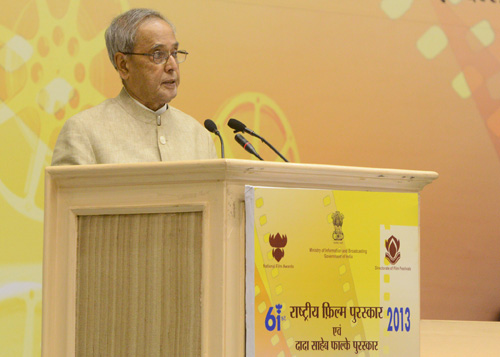
1. It is indeed a privilege for me to be present amidst you on the occasion of the 61st National Films Awards.
2. The National Film Awards are an annual milestone in the nation’s cinematic history. It not only symbolizes public accolade and mass acceptance but also immense prestige befitting the highest governmental recognition in the field of cinema.
3. I heartily congratulate the recipients of the 61st National Awards. My special congratulations go to Gulzaar ji who has been honoured with the Dadasaheb Phalke Award this year. His contribution to cinema, as a writer, poet and a film maker of rare sensitivity, has been tremendous. The nation has honoured him with a Padma Bhushan and Hollywood with an Oscar. The Dada Saheb Phalke award is yet another feather in his cap. We are proud of you, Mr. Gulzar.
4. I understand that a record-breaking number of more than 470 entries were received this year. This is indicative of the growth of quality cinema in our country and the importance the Indian film fraternity attaches to National Film Awards. My compliments to all Members of the distinguished Jury for their commendable though onerous job of selecting Award winners. This task, I am sure, must be very challenging and daunting.
5. The vibrant Indian film industry produces over 1000 films in more than a dozen languages annually. Our cinema is not only a showcase of the multicultural diversity of our country but is also a tribute to our linguistic richness. It is a national treasure and our country’s "soft power” in the true sense of the term, forging international ties and connecting global horizons with ease.
6. I take this opportunity to reflect upon an important aspect of cinema. Besides being a strong medium of expression, cinema is a vehicle of influence and persuasion for the youth. When our children witness scenes depicting violence and bloodshed, it does affect their psyche. It is incumbent on our film makers to make a concerted effort to distinguish between what clearly is an art form and what is not. The cinematic content of films should have a desirable impact on the social behaviour of people, especially the new generation. Faced with erosion of values in today’s context, cinema should play a catalytic role in resetting our moral compass. Our film makers should deploy their creative efforts to present and propagate core values such as patriotism, respect for women, compassion and tolerance, and honesty and discipline. I am hopeful that everyone associated with the film industry will use their talent, creativity and artistic pursuits to create meaningful and socially relevant cinema.
Friends:
7. India’s media and entertainment industry is today at the cusp of a transformation. It is poised to leapfrog into a completely digital landscape. Indian cinema connects with millions of people – within the country and abroad, directly through theatres, close to two thousand multiplexes and through TV as well as the Internet. In 2013, the Indian Media and Entertainment (M&E) industry registered a growth of 11.8 per cent over 2012 and did a gross business of around Rs. 92,000 crore. The industry is expected to register a compound annual growth rate of 14.2 per cent to touch Rs. 1.8 lakh crore by 2018.
8. Technology and scientific advancements of this digital decade has thrown open the floodgates of opportunities. However, it is the triumph of the human spirit and the building of real talent that will always define the cinematic progress. We need storytellers to tell us the stories; artistes to translate these stories into celluloid; content creators and content editors to make our stories slick and cinematographers to speak to our souls through images. As we embrace the future, we must continue to draw inspiration from the cinematic greats of India - Dadasaheb Phalke, Satyajit Ray, Ritwik Ghatak, Bimal Roy, Mrinal Sen, Adoor Gopalakrishnan, M.S. Sathyu, Girish Kasaravalli, Guru Dutt and many others who have been torchbearers within the country and on the world stage.
9. I am happy to note that more and more young film makers are entering the field of documentaries. Documentaries provide an opportunity to address contemporary social subjects, many of which have been long swept under the carpet on account of the discomforting questions they raise. I am happy to note that the Government is contributing towards strengthening the documentary movement in the country by holding an International Film Festival of documentaries every two years.
Friends:
10. We are approaching completion of Elections to the 16th Lok Sabha, the most extensive electoral exercise undertaken anywhere in the world and what commentators call a ‘Festival of Democracy’. It is heartening that many from the film industry have, on their own and in collaboration with the Election Commission, have actively promoted participation by citizens in the democratic process and in particular, emphasized the importance of casting the vote.
11. I note the participation of a large number of luminaries from the film industry in the electoral contest this year. Many important political leaders have emerged from the film industry in our country and cinema has played a critical role in highlighting social and political issues of concern as well as exposing the deficiencies in our political system.
12. The Indian film industry comprises of people drawn from different parts of the country, who speak different languages, profess different religions and belong to different strata of society. It is an industry which has provided opportunities for many to rise from rag to riches. I call upon the film industry to nurture and strengthen its openness, pluralism and inclusiveness and disseminate the same throughout the country.
13. I once again convey my compliments to the Members of the Jury, each of whom is an eminent film personality, for the commendable job done by them, and congratulate once again all the award winners of today.
JAI HIND
